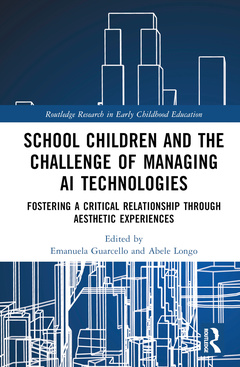School Children and the Challenge of Managing AI Technologies Fostering a Critical Relationship through Aesthetic Experiences Routledge Research in Early Childhood Education Series
Coordonnateurs : Guarcello Emanuela, Longo Abele

This edited volume recognises the need to cultivate a critical and acute understanding of AI technologies amongst primary and elementary school children, enabling them to meet the challenge of a human- and ethically oriented management of AI technologies.
Focusing on school settings from both the national and international level to form comparative case studies, chapters present a robust conceptual and foundational framework within a global context as the idea of AI and our relationship to it advances apace. The book uses research garnered from interviews and observational data, qualitative and quantitative research, and theoretical findings gathered from single schools or institutions across the world. Providing an innovative perspective in promoting the importance of a critical, creative and ethical orientation based on aesthetic experiences, the book focuses on development in areas like visual arts, literature, environmental education, robotics, photography and screen education, movement and play.
Ultimately, the book responds to an urgent and time-sensitive call to provide guidance on AI to primary education researchers and will be of interest to academics, scholars and researchers in the fields of primary and elementary education, technology in education, children's rights education, and moral and values education more broadly.
Introduction
Part 1. The relationship between new generations and AI technologies
1 The “compound” act of transformation: the case of AI
3 Artificial Intelligence and new perspectives for teaching/learning processes
4 Leading engagement and learning in, out and between digital and non-digital environments. Hybrid-transitions as a space for children’s agency
5 The dystopian threat of AI in primary education: looking towards a utopian postdigital ecopedagogy
7 The challenges of managing AItech: new educational needs for new generations
Part 2. Fostering a critical relationship with AI technologies through aesthetic experiences
8 Aesthetic and techno-aesthetic experiences to educate school children in critical sensitivity and judgement
10 AI, new forms of reading and agential children’s literature
11 Aesthetic experiences as a space of possibility
12 Towards a postmedia literacy: AI photographic filters, education, and self-representation
13 AI and robotics in education: catalysts and complexities
14 The use of artificial intelligence in various artistic researches on the problematization of physical space in relation to virtual space as a platformfor education
15 Educating through creativity with AI, with a view to the development of critical thinking
Part 3. Educational projects in primary school
16 The Child –AI Rεlationship: the CAIRε research project educational experience
17 International call for AI Ethics: children draft their Ethical Charter on AI
18. Aesthetic experiences and immersive virtual environments: the IVE4Thinking educational project
20 The social robot Nao as an Intelligent Tutoring Robot: conducting the TCR test in primary schools
21 The VR research on educational contexts in Mexico, a critical review of the literature
22 Designing an artificial intelligence curriculum for primary schooling
Conclusion. From experiences to educational practices: lead project for promoting a critical management of AItech
Emanuela Guarcello is Professor in Childhood and Primary Teachers Education, Department of Philosophy and Sciences of Education, University of Turin, Italy.
Abele Longo is Senior Lecturer in Translation Studies, Department of Education, Middlesex University, UK.
Date de parution : 06-2024
15.6x23.4 cm
Thème de School Children and the Challenge of Managing AI... :
Mots-clés :
AI Technologies; Education; Primary School; Critical Thinking; Critical Judgement; Aesthetic Experiences; educational-didactic experiences; utopian postdigital ecopedagogy; school children; Postmedia Literacy; Intelligent Tutoring Robot; Z-generation; Gen-Z; dystopian threat; postdigital ecopedagogy
